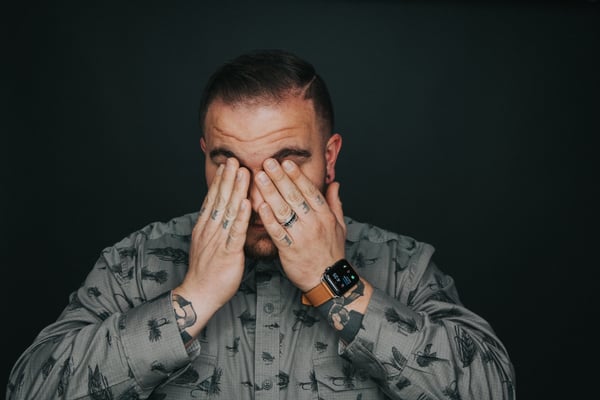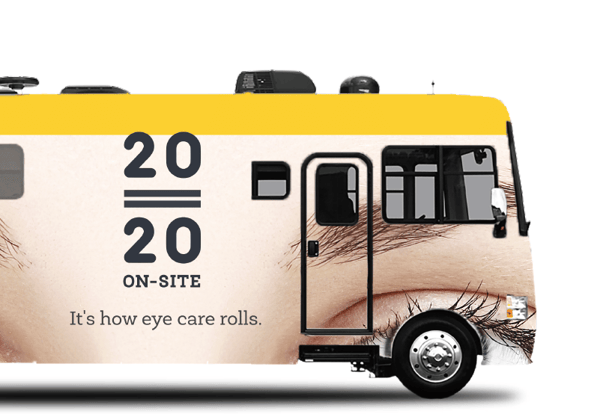
Photo by Eric Ward on Unsplash
Most eye care experts recommend that you have a comprehensive eye exam every one to two years, depending on your age, risk factors, and whether you currently wear corrective lenses. Vision care is our business here at 2020-On-site, so we’ve pulled together this set of guidelines for keeping your eyes in top condition.
CHILDREN
According to the American Optometric Association (AOA), children generally should have their first eye exam at 6 months of age, another exam at age three and again at the start of school. Risk-free children should then continue to have their eyes examined every two years until age 18.

Photo by Michal Bar Haim on Unsplash
Children with risk factors for vision problems may need their first eye exam earlier than 6 months of age and may need more frequent eye exams throughout childhood. Examples of risk factors include:
- Family history of eye disease
- Developmental delays
- Turned or crossed eyes
- History of premature birth or low birth weight
- Infection of mother during pregnancy
- High refractive error, also known as anismoetropia
- Other physical illness or disease
Children who currently wear eyeglasses or contact lenses should have annual eye exams, according to the AOA.
Routine eye exams are essential for children to be ready to learn in school, since experts say more than 80 percent of the information children receive in classrooms is presented visually.
ADULTS
To maintain a lifetime of healthy vision, the AOA recommends a comprehensive eye exam every two years for adults ages 18 to 60, and annual exams for seniors age 61 and older.

Photo by Noah Buscher on Unsplash
At risk" adults should have more frequent exams. Risk factors for adults include:
A family history of eye disease (glaucoma, macular degeneration, etc.)
- Diabetes or high blood pressure
- A visually demanding occupation or one that may pose hazards to the eyes
- Taking prescription or non-prescription drugs that may have visual or eye-related side effects
- Previous eye injuries or eye surgery
There are some signs and symptoms that should send you to the eye doctor for an eye exam—even if you aren’t officially due for one. If you experience any of the symptoms below, you should schedule an eye exam as soon as possible, and in some cases, immediate medical attention is required.
1. Sudden appearance of visual disturbances such as floaters, flashes of light, or obstruction of vision
Onset of any of these visual disturbances could be a natural aspect of aging, or, more dangerously, a sign of a serious, vision-threatening disorder such as a retinal detachment, retinal tear, or retinal hole. So seek immediate medical attention by an optometrist, ophthalmologist or emergency room physician for proper diagnosis and treatment to minimize vision loss.
2. Sudden blurry vision or problems focusing
These can be a sign of a larger health issue and should always be taken seriously. If the blurry vision comes and goes, or is limited to one eye, you should schedule an exam with as soon as possible.

Photo by Esaias Tan on Unsplash
3. Gradual blurring of vision
This is the type of vision degradation that gradually happens over time. If you are noticing that you’re moving a book or the computer screen further away from your eyes than you use to to improve clarity, it’s probably time to get an eye exam. Same goes if you notice yourself sitting closer to the television or bring objects closer to you to read them.
4. Squinting
We squint when we’re having difficulties seeing because the act of squinting reduces extraneous light entering the eye and reduces light scattering, improving vision. This is often one of the first signs in children that they may need eyeglasses.
In addition, squinting coupled with an eye turn, more commonly called a “lazy eye”, is a definite red flag that a comprehensive vision exam is in order. This is especially true in children, and if not detected and treated early enough, permanent vision loss may result. If you notice yourself squinting more than usual, schedule an eye exam.
5. Headaches
Frequent headaches can be caused by many factors--including a vision problem. Changes in vision take place slowly and are often imperceptible at first. However, chronic headaches can be one of the early warning signs of a change in vision. If you are experiencing recurring headaches, you may want to consider getting your eyes checked.
6. Eye pain or eye fatigue/eye strain
Having some infrequent eye pain or eye strain isn’t usually a big problem. Everything from the amount of sleep you’re getting to seasonal allergies, or working long hours at a computer can cause temporary eye pain or fatigue.

Photo by Hermes Rivera on Unsplash
If you experience ongoing eye pain for more than a few days, or if you have ongoing eye pain with eye movements, get it checked out. This can sometimes be a sign of an eye infection or more serious health condition, or even a warning sign that your vision has changed.
7. Light sensitivity
A sudden onset of sensitivity to light can be a sign that you should get an eye exam. Light sensitivity can be a symptom of a number of disorders or eye diseases (as well as an eye infection.)
8. An eye infection
If you have swelling of the eyelids, itchiness, redness, a pink discoloration of the whites of your eyes, and/or discharge, you may have an eye infection. If you experience any of these symptoms, schedule an eye exam immediately to have it looked at. Some eye infections, such as conjunctivitis or “pink eye,” are contagious and should be dealt with as soon as possible.
9. Any eye injury
If you experience a blow to the eye, or something sharp enters the eye, it’s time to see your eye doctor.

Photo by Nonsap Visuals on Unsplash
10. If you haven’t had an eye exam in the past two years
If you haven’t had a full eye exam in the past two years, you should schedule one—especially if you are over the age of 40. For some people, an exam sooner than every two years is critical to ensuring your eyes--and you--to stay healthy. In fact, a number of health conditions such as diabetes, high blood pressure, and high cholesterol can be diagnosed via an eye exam.
Natural changes in the eyes associated with age makes more frequent eye exams necessary as you grow older.
AT THE EXAM
Be sure to discuss all concerns you have about your eyes and vision with your eye doctor. Tell him or her about any history of eye problems in your family, as well as any other health problems you may have.
Your eye doctor should know what medications you take (including non-prescription vitamins, herbs and supplements). This will help with appropriate recommendations to keep your eyes healthy and functioning at their optimum level throughout your lifetime.
Getting ready to schedule your exam? Think of us, 2020 On-site--we bring eye care directly to your workplace, and can do a complete, comprehensive eye exam in about the time it takes you to have a coffee break. 97% of the more than 30,000 people who’ve used our service say that they’d recommend us to others and would use us again. Contact us for more information.
To see what an exam with us is like, check out our brief (and fun) patient experience video. And then let your HR team know that you’re interested in having your eyes checked in our cool, state-of-the-art, mobile vision center.

Sources:
https://www.mayoclinic.org/tests-procedures/eye-exam/about/pac-20384655


